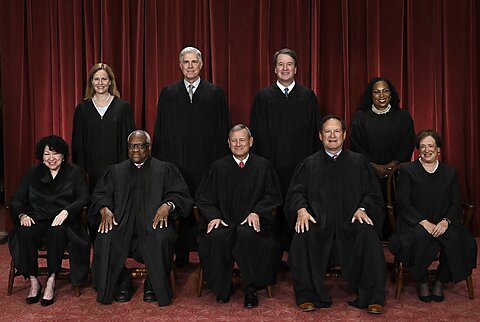
Anastasia P. Boden
Give a critical mouse a Supreme Court ethics code and it’ll ask for a glass of milk. Is that how the saying goes?
This week the Supreme Court issued its first public code of conduct. Facing increasing accusations that the justices are too cozy with political organizations and billionaires, and in response to the misunderstanding “that the Justices … unlike all other jurists in this country, regard themselves as unrestricted by any ethics rules,” the Court released eight pages reflecting what it had long adhered to internally.
The code covers what you’d expect: resisting outside influence or the appearance of outside influence, recusal guidelines, and participation in extrajudicial activities (i.e., no fundraising, no political activities, no promoting commercial products). For two recaps of the code, see here and here.
The guidelines make good sense and no one seems to object to the substance. But critics had objections nonetheless, quickly pointing out that there was no way of enforcing the code. Instead, the justices are expected to comply or presumably face the private wrath of Chief Justice John Roberts. This led some to insist, once again, that Congress must step in and pass its own standards and impose some form of accountability on the Court.
If people are truly concerned with the Court’s credibility or impartiality, that seems like a very bad idea. Making the justices attend histrionic and performative congressional hearings would be disastrous for the Court’s image. And even if the hearings were administrated by lower court judges rather than legislators, it would mean dragooning those judges into an often politically motivated process. For more about the difficulties and dangers of creating an enforcement mechanism, here’s an entire article about it.
But there’s another reason to be wary of congressional action: it’s not even clear Congress has the authority to pass an ethics code for the justices in the first place. While the Court currently abides by disclosure requirements applicable to other judges and government employees, the justices have made clear they do so voluntarily, not because they think they’re bound. Arguably, they’re not.
There’s nothing in the Constitution explicitly authorizing Congress to pass such a code. Under Article III, Congress can set the number of justices and modify their pay (though it can’t reduce their salaries while the justices are in office, which reinforces the Constitution’s expectation that the judiciary will enjoy independence from Congress).
Article III also states that the Supreme Court “shall have appellate Jurisdiction” over certain matters “both as to Law and Fact, with such Exceptions, and under such Regulations as the Congress shall make” (emphasis added). Some say this provision empowers the legislature to write binding ethics rules. But it can’t mean that Congress has plenary power over the Court’s internal operations because such an interpretation would lead to separation of power concerns. Instead, the language would seem to empower Congress to determine the nuts and bolts of how cases get to the Court. And in fact, it would be odd if the provision permitted Congress to pass an ethics rule for cases that arise under the Court’s appellate jurisdiction since those rules would not apply to cases arising under the Court’s original jurisdiction.
There are also some practical difficulties. Let’s say Congress tried to directly impose a binding ethics code on the justices. Any questions over the code’s constitutionality would go to … well, the Supreme Court, which could result in something of a crisis (or at least a chess match). What would happen if the Court refused to comply? Congress could retaliate by limiting its jurisdiction. Or, if it had good enough reason, it could try to impeach. But the very effort would start a game of constitutional chicken, which would not be great for the stability of our institutions (or judicial independence).
Before people who purport to care about the Court’s legitimacy throw the institution into a full‐blown crisis, it’s worth noting that no serious observer of the Court actually thinks the justices are being bought and sold. No one has even attempted to point to a case where they think a justice has compromised his or her vote out of loyalty to some third party.
The idea that someone like Justice Thomas, who is well‐known for his consistent judicial philosophy and readiness to dissent rather than compromise his principles, is trading his vote for a ride on a private plane is preposterous. In fact, the man said to be “buying” him, his close friend Harlan Crowe, doesn’t even have business before the Court. Crowe is also openly pro‐choice, meaning the justice is doing a very poor job of acting as his proxy.
Similarly, while Justice Alito has been criticized for failing to report he took a private plane chartered by “Republican megadonor” Paul Singer, Singer had no business before the Court at that time. Since then, the Court has repeatedly turned down Singer’s company’s request to take up its case, and, in the one case it did, the Court voted 7–1 in his favor. Also, Singer has spent millions trying to legalize same‐sex marriage, complicating the narrative.
The accusation isn’t that the justices are changing their votes in exchange for luxury travel; it seems to be that they are flouting disclosure rules and thus “see themselves as above the law.” But there’s a serious argument that travel costs qualify for the personal accommodation exception to the disclosure rules. And lest we forget, justices nominated by presidents from both political parties have had their travel paid for by others to get to events. Even colleges have offered to use private planes to transport the justices.
In other words, there’s a lot of simplification, obfuscating inconvenient facts, and selective amnesia going on (see: colleges paying $100,000+ for books signed by Justice Sonya Sotomayor, or the justice failing to disclose travel payments or to recuse from a case involving her publisher). One begins to wonder whether the accusations, most often directed at “conservative” justices, aren’t intended to destabilize the Court rather than rehabilitate it.
The same goes for the accusations that the justices are “fundraising” for “political causes.” There’s been a lot of hand‐wringing over the justices’ appearances at Federalist Society events. But the Federalist Society neither lobbies nor litigates, and it’s no more political than the American Constitution Society, which has hosted events for justices on the other side of the bench.
Calling either of these organizations political erroneously conflates judicial philosophy with partisan politics. And most, if not all, of the justices regularly appear at colleges, which themselves have become political. University officials routinely use the justices’ appearances as fundraising opportunities for large donors.
The complaint seems to be that the justices attend or speak at events that are also attended by wealthy people who donate to political causes. Well, of course, they do. The justices went to elite schools and had elite careers. It’s no surprise they run in high‐powered social circles and are sought‐after speakers at high‐profile events. And it’s no surprise that the host institutions (including colleges) use these appearances as fundraising opportunities, even if the justices are not engaging in fundraising themselves. So yes, the institutions are very glad to advertise their events to donors. And yes, some of those donors will also donate to political causes. None of that means that the justices are unable to perform their duties impartially or are engaging in political or fundraising activities themselves.
We can squabble over whether the “gifts” (Crowe buying Justice Thomas’s mother’s house for future use as a museum, RBG receiving a large monetary award and donating it to charity) were “gifts” subject to disclosure rules or whether they truly raise the specter of impropriety. My own opinion is that most of the accusations are overblown and that most of these things (private travel to events, trips with close family friends) are different than gifting someone a Rolex. That being said, there are cases where I think the justices should have disclosed or perhaps, in their better judgment, refrained.
Still, it’s important to recognize the difference between the judiciary and the legislative branch, which presents a far greater opportunity for corruption. Law is simply not like politics. Politicians wield a far more dangerous power than judges. Politicians pass laws that directly threaten liberty; judges pass judgment on the constitutionality of those laws. Politicians have nearly unlimited opportunity to vote on measures directly affecting our everyday lives and can do so arbitrarily or self‐interestedly without anyone knowing because they vote on omnibus bills that hardly anyone reads. There are simply too many bills to keep track of, and there’s less political accountability than ever now that Congress outsources a lot of its work to the administrative state.
Legal interpretation, by contrast, is limited and transparent. The justices only take a handful of cases a year (fewer than ever), engage in open oral arguments, and write lengthy opinions justifying their decisions. Unlike the frequent and accepted vote‐trading that goes on between politicians, it’s quite clear when judges are compromising their long‐held principles. Judging doesn’t present the same opportunity and danger as the political branches. And to the extent that Congress is concerned about the Court, well, you know that saying about people in glass houses.
The point is, if we are concerned about legitimacy, we should be thoughtful about how we characterize the Court and the remedies we suggest. That’s not to say the rules cannot be improved or clarified or that the justices can’t do better. It’s only to say that the current state of the debate has the potential to do more damage to the Court than bolster it.





